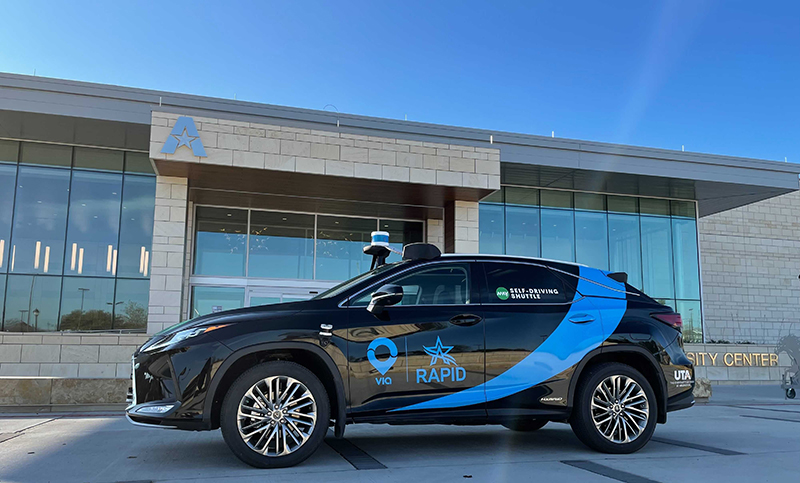
It’s no wonder Ann Arbor should spawn Michigan’s two most promising near-unicorns in May Mobility and Groundspeed Analytics, as well as two of its actual unicorns, DuoSecurity and Llamasoft.
Ann Arbor is Michigan’s petri dish for unicorns, with the resources and vibe of the University of Michigan campus and its $1.6 billion in annual research volume (FY20), singular tech-focused operations ranging from the Domino’s Garage digital beehive to one of the world’s leading autonomous-vehicle testing sites called Mcity, and research headquarters for Toyota and Hyundai.
There’s also a vaunted startup incubator called Spark. Even Zingerman’s, which owns a thriving business-consulting outfit, is a crucial node as entrepreneurs huddle at its iconic bakery and restaurant.
“Take a look at the statistics around entrepreneurship and creating an environment for startups, and Ann Arbor and southeastern Michigan have many of them,” says Jeff Mason, founder and CEO of Groundspeed Analytics, which has created an internet-based ecosystem for the vastly more efficient exchange of information in the document-heavy commercial-insurance business.
“People are very educated and there’s easy access to talent across many different fields in Ann Arbor. U-M is in the top 10 (U.S. universities) in maybe 15 different specialties. The cost of living is great, yet you get many of the benefits of infrastructure, social services, and quality of life that normally only are offered in cities 10 times its size.”
Mason leveraged these resources, along with advanced machine-learning and image-analysis techniques and his own background in alternative financing and casualty insurance, to establish Groundspeed in 2016. The objective was to help brokers and customers communicate better in the middle market and large-placement sectors of the commercial-insurance business, which has been “entirely conducted through email, manual and grueling processes on both sides,” he says.
Local investors included the Michigan Angel Fund and Tappan Hill Ventures, joining a group of New York-based VCs. The Michigan Economic Development Corp. and Spark, now a 15-year-old economic-development organization for the region, helped as well.
Mason has validated their bets, with customers including insurance giants such as Aon, Willis Towers Watson, Travelers, and Liberty Mutual. Groundspeed tripled revenue in 2021 and is “solidly on the way” to unicorn status by 2023, he says.
But the journey to the next lofty position hit reality and required a pivot. COVID-19 whacked Groundspeed’s workplace culture in Ann Arbor, as it did most other companies, emptying out the enterprise’s cool industrial-themed office space. While the building fills up on many typical weekdays and for special collaborative meetings, on some days it’s only Mason and his Wheatondoodle, Jessie, who see the long table of dozens of tech workstations in the building’s largest room.
“We’ve completely changed our work culture, and now we’re remote first,” Mason says. “We’ve got team members in 30 different states.”
May Mobility, meanwhile, is more physically concentrated in Ann Arbor because it’s actually modifying automobiles on-premises. The company is closing in on unicorn status just four years after its founding as one of the vanguards of autonomous-driving startups addressing a potentially vast global market. The firm has solidified its position as a leader while some others have faltered, and is now operating shuttles in five cities in the United States and one in Japan.
“We have delivered more than half of the revenue-generating rides across the entire (AV) industry,” says Edwin Olson, co-founder and CEO of May Mobility. “All of them are on public roads in mixed traffic; we’re not focusing on low-speed parking-lot trams. All of our street-legal vehicles drive with traffic and deal with the full customer experience.”
So far, May’s clients are mainly “municipalities trying to solve transportation problems” in cities including Ann Arbor; Arlington, Texas; Indianapolis; and Hiroshima, Japan. In Hiroshima, it’s operating vehicles on a 1.9-mile route on the campus of Hiroshima University.
Additionally, in Grand Rapids, May Mobility operates a 3.2-mile fixed route, and local employers “have kicked in to help provide transportation because it benefits their employees,” Olson says. The company also participated in pilot projects in Detroit, Columbus, and Providence, R.I., and took on a handful of private routes for corporate clients.
Olson is an MIT graduate who led U-M’s winning team in a 2010 mapping competition and worked with Ford on AVs before joining the Toyota Research Institute in Ann Arbor. Toyota staked May Mobility to $50 million in initial funding in 2019, and the AV outfit has raised a total of about $86 million through Series B funding.
All the while, May Mobility is pursuing people-moving, even though the quickest and broadest commercial applications of driverless technology are coming in moving goods instead.
“There’s a greater business opportunity with people,” Olson says. “People-moving is generally a higher-margin business. People are the most valuable things there are, and they care how long they’re waiting, whereas if your grocery delivery is delayed by five minutes, it’s no big deal. With logistics, autonomy doesn’t have to work as well.”











